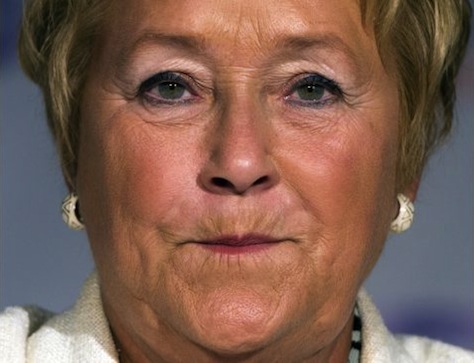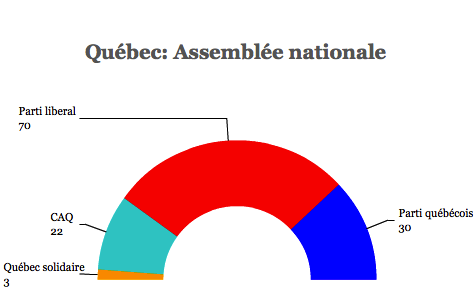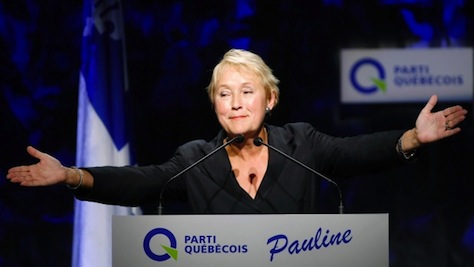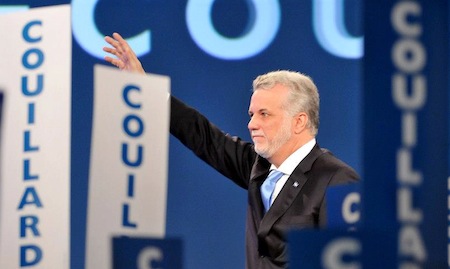The sovereigntist Parti québécois (PQ) has lost power after just 18 months leading a minority government. ![]()
![]()
Instead, former health minister Philippe Couillard, barely a year after winning the leadership of the federalist Parti libéral du Québec (Liberal Party, or PLQ), will lead a majority government as Québec’s new premier.
Incredibly, in the riding of Charlevoix–Côte-de-Beaupré, premier Pauline Marois has lost her race against Liberal Caroline Simard, and in an address to supporters, announced she would step down as PQ leader as well.
Here’s the breakdown of the 125 ridings in Québec:
When she called a snap election in March, Marois had every reason to believe that she would sail through the election and win a majority government for the PQ.
Conservative Canadian prime minister Stephen Harper was so worried about the prospect of a separatist majority in Québec that he reached out to the leaders of the other major parties, including Liberal Party leader Justin Trudeau and New Democratic Party leader Thomas Mulcair for advice. Though Trudeau and the federal Liberals endorsed Couillard and the PLQ, the Tories and the NDP have remained neutral.
With nearly 97% of the vote reporting, here are the vote totals:
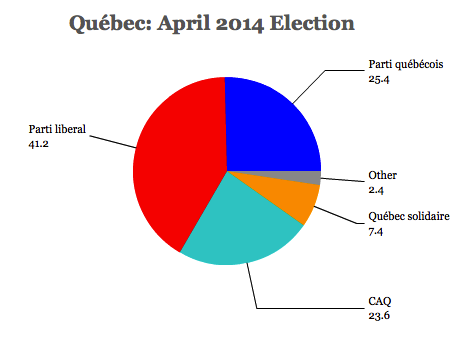 The last time the PQ won such a small share of the vote in a provincial election was in 1970, when it won just 23.06%, when it was running in its first election after its foundation in 1968.
The last time the PQ won such a small share of the vote in a provincial election was in 1970, when it won just 23.06%, when it was running in its first election after its foundation in 1968.
The PQ has suffered what might be an even more humiliating defeat than its 2007 showing, when the PQ placed third, behind both the Liberals and the predecessor to the CAQ, the Action démocratique du Québec (ADQ) — it won just 36 seats and 28.5% of the vote.
Among the key individual races:
- In L’Assomption, François Legault, the leader of the center-right Coalition avenir Québec (CAQ) won his race against the PQ’s Pierre Paquette, a former federal MP from the sovereigntist Bloc québécois.
- Couillard easily won a race in his riding of Roberval, which was supposed to be a difficult race against the PQ’s Denis Trottier, an incumbent since 2007.
- In Saint-Jérome, former Quebecor CEO, Pierre Karl Péladeau defeated Liberal candidate Armand Dubois — though Péladeau played a controversial role in the election campaign, he could well become the PQ’s next leader.
- In Laval-des-Rapides, the 22-year-old former student leader Léo Bureau-Blouin lost his bid for reelection to Liberal businessman Saul Polo.
- In Crémazie, PQ language minister Diance De Courcy and in Saint-François, PQ health minister Réjean Hébert lost.
The CAQ had a much better night than it could have expected. It will improve on its current 19-seat caucus by a handful of seats.
There’s no doubt that the PQ campaign now seems like an incredible miscalculation, and Marois will almost certainly step down as the PQ’s leader. But how did Marois and the PQ fall so far? Here are four reasons that show how tonight’s result came about.
Continue reading Québec election results: Four reasons why the PQ blew it
